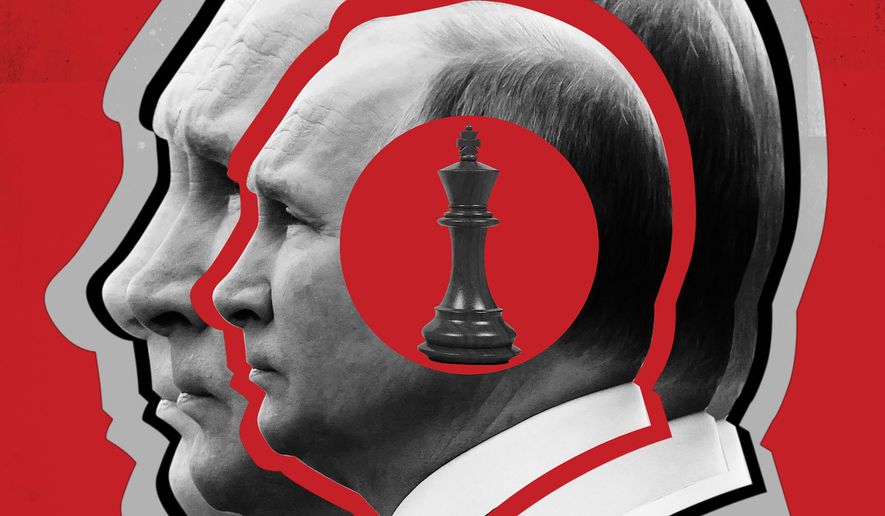OPINION:
For those who have ever had the pleasure of serving in Moscow’s “belly of the beast,” there must have been little surprise when KGB officer Vladimir Putin emerged from the ash heap of the Soviet Evil Empire as president of Russia in 2000. After all, Russia’s ruthless Federal Security Service continued its cloak-and-dagger espionage operations full throttle even while the rest of the country was unraveling under President Boris Yeltsin’s wobbly leadership during Russia’s chaotic first post-Soviet decade.
Mr. Putin, then serving as director of the FSB, was poised to take advantage after the financial collapse that brought Russia to the breaking point in 1998.
Three phases have marked Mr. Putin’s two decades in charge. First, he consolidated power after viciously subduing Chechnya and taking control of Russia’s popular media. Following a period of productive engagement after the 9/11 terrorist attacks, the president embarked on a period of not-so-peaceful coexistence with the West, punctuated by a massive cyberattack against Estonia; a hybrid war against Georgia; the invasion of eastern Ukraine and illegal annexation of Crimea; interference in U.S. and European elections; and the use of banned chemical and radioactive substances against those who dared to defy him, including Alexander Litvinenko, Sergey Skripal and Alexey Navalny.
The third phase is now in full operation, as Mr. Putin has decisively broken with the West by launching the most destructive land war in Europe since WWII.
Mr. Putin has grossly misrepresented his brutal war against Ukraine as a “special military operation” to overthrow Kyiv’s “neo-Nazi” government. While Mr. Putin’s proclaimed role model, Peter the Great, saw the great advantage to his own people of commercial and educational exchanges with the West, Mr. Putin, who fears democracy more than anything else, has slammed shut Russia’s window to Europe.
Deliberately portraying Russia as a besieged fortress only he can defend, Mr. Putin has declared war on democracy in a bid to preserve both his regime and his legacy.
As counterintuitive as it might appear, the Russian leader is now seeking to exploit NATO’s justified reaction to his unprovoked war against Ukraine for propaganda purposes. Mr. Putin knows NATO is a defensive alliance that poses no military threat to Russia. But he will use the decision by Finland and Sweden to apply to join NATO — precisely because of the Ukraine invasion — to convince his people that a menacing enemy is at Russia’s gates.
Mr. Putin does this because “maskirovka” — KGB-speak for deception — is hardwired into his DNA. Nothing threatens his regime’s security more than a Western-oriented Ukraine, with its sizable Russian-speaking population. Mr. Putin’s war against Ukraine is all about discrediting democracy, liberty and freedom in the eyes of his own subjugated population.
But that is only half of it. Mr. Putin has also purposefully shifted Russia into China’s orbit. Knowing that Russia cannot compete with China economically or militarily, Mr. Putin has volunteered his country to become an economically subservient junior partner to Beijing.
Stalin signed a nonaggression pact with Hitler in 1939. An alliance with a long-term strategic rival against the interests of his own population is nothing new to this KGB operative-in-the-Kremlin.
China’s communist dictatorship has built what Mr. Putin covets: an Orwellian police state with a potent internet firewall against dissenting voices and a world-class, data-driven surveillance system to keep its own people in line. Russia shares China’s determination to reduce the West’s global influence and has overtaken Saudi Arabia as China’s top supplier of oil.
In response, the U.S. national security strategy should focus on three policy objectives.
First, win the war in Ukraine. Failure to stand by Kyiv now would reward Mr. Putin’s aggression and undercut NATO’s determination not to let dictatorships change borders through the use of force. The U.S. intelligence community is on the hook to assess what military and logistical support is needed to transform the correlation of forces on the battlefield in Ukraine’s favor.
Second, the China-Russia alliance makes every other national security problem — from Afghanistan and Iran to North Korea and the competition in outer space — that much more difficult to manage for the West. The U.S. will need to build on its global alliances to counter and deter the Russo-Chinese axis.
Third, the U.S. needs to drive a wedge between Russia and China, ensuring Beijing continues to limit its exports to Russia out of concern for losing access to Western markets. China, it should be made clear, is getting a junior partner that is more trouble than it is worth if it wants to throw in its lot with the Kremlin.
The Biden administration should more vociferously emphasize the Russian military has the power to end Mr. Putin’s destructive war. A renewed, mutually beneficial relationship with the West is only possible once the Kremlin stops raining down hell on Ukrainian innocent civilians, withdraws its forces, and agrees to a peace settlement that respects Ukraine’s sovereignty and territorial integrity.
• Daniel N. Hoffman is a retired clandestine services officer and former chief of station with the Central Intelligence Agency. His combined 30 years of government service included high-level overseas and domestic positions at the CIA. He has been a Fox News contributor since May 2018.




Please read our comment policy before commenting.